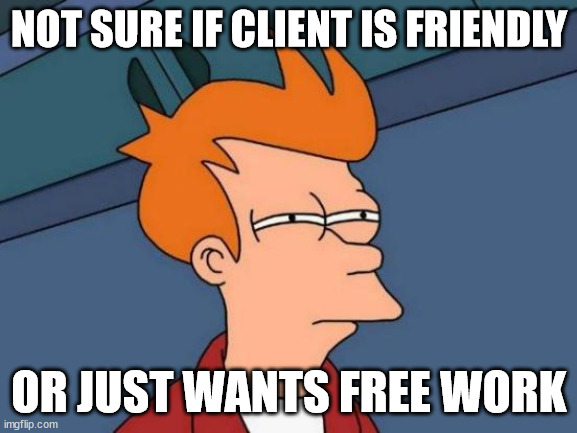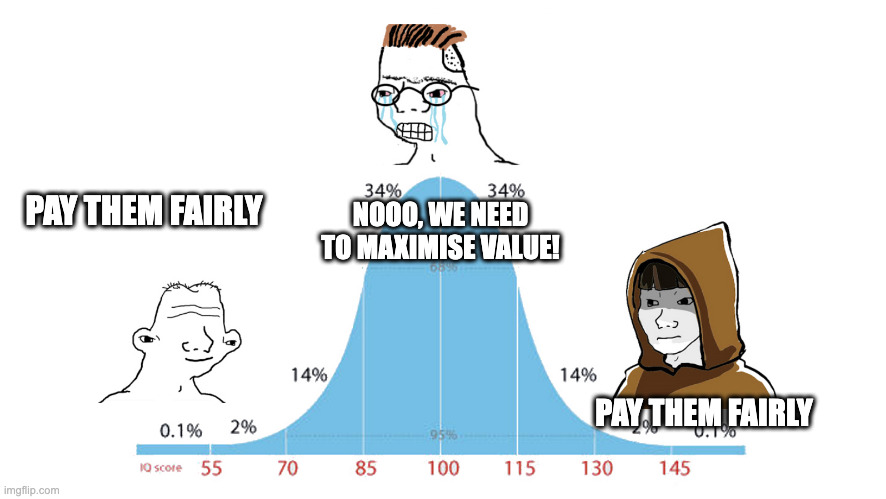Handling difficult clients: lessons from experience
Freelancers have to deal with difficult clients from time to time, so here are some thoughts and lessons from my less-than-pleasant experiences.
Adam Woodard
4 min read


Any freelancer needs to know how to handle difficult clients. It’s almost inevitable that you’re going to encounter them, and learning from the experiences and mistakes of others can save you a lot of exasperation. I’ve had my fair share of difficult clients, so here are some lessons I’ve learned.
Knowing the warning signs
Everything seems obvious with hindsight, but a little foresight isn’t completely impossible. When interacting with a new or potential client, there are some signs to consider that may indicate difficulty lies ahead for you. These aren’t a guarantee, but something to bear in mind.
The first of these is their willingness to engage, whether in negotiating terms or simply through regular communication. Some clients want to hire someone based solely on their own (unfounded) expectations, leave the freelancer to it, and get the perfect result every time. They might be hard to reach, unwilling to entertain the idea of negotiating, and reluctant to give feedback. Then, when they don’t get exactly what they imagined, they blame the freelancer.
A reasonable client will speak to you prior to starting work. They’ll want to get an idea of who’s doing the work and whether terms are agreeable. They may check in on work progress, although once they develop trust they’ll leave you to it. They might not do all these things. But if they do none of them, be wary.
Of course, the opposite may also exist. Some clients might not leave you alone to work and insist on unceasing communication, demand progress updates unreasonably, and attempt to micromanage your work. They can be hard to please and care little for the fact that, as a freelancer, they might not be your only client.
My third sign to watch out for is friendliness. I like having friendly clients as much as the next person, but there are some boundaries to consider. The relationship between a client and a freelancer is a professional one. Friendliness is a sign of decency and a recognition that you’re dealing with a human. The issue arises when certain clients try a little too hard to befriend you. What might happen then is you start thinking of them as a friend first and a client second. Then you start getting requests for favours or extra work, with little or no additional compensation, and you’re on a slippery slope towards being taken advantage of.
Don't do work for free just because you think of your client as a friend. On that note, I'd also add that it's best to avoid working with friends, as friendship and money don't mix. If your friend wants something done, they can buy you dinner or something to say thanks. If you don't want to do them a favour as a friend, refer them to another freelancer.
Picking and choosing
Having recently had a rather pleasant interaction with a client, I couldn’t help but contrast the experience with others that were less so. Given the choice, we’re always going to opt for clients who are professional and pleasant. After all, isn’t being a freelancer all about working for whomever you want and whenever you want?
Anyone who’s freelanced knows this isn’t always the case. Sometimes, the nice clients are all busy somewhere else and you’re left with someone whom even a pacifist would want to bludgeon. So, how do you choose? Ultimately, this is up to you and your knowledge of your own ability to handle or tolerate them. If you’re able to keep difficult clients at arm’s length until you get some better ones, go for it. Handling them is a skill that’s worth developing. But if you start dreading contact from a client and your heart drops when you see their name in your inbox, consider renegotiating or ending the agreement. It’s not worth your mental health if you can avoid it.
Aside from picking and choosing your clients, you may also have to pick and choose the issues you raise and ignore. Let’s say that you’re chatting to your client and they make an off-the-cuff remark regarding their personal opinions. Perhaps they got into politics or religion. This is not something you typically want to engage in. If you can, change the subject back to work.
However, if they say something unethical, that’s a different matter. In this case, you might want to diplomatically tell them to reconsider what they’re thinking (or thinking of doing). If you have your doubts about a client like this, your best course of action is to get out of there as soon as possible. You don’t want to wait around to find out that what you heard was just the tip of a much larger iceberg.
If you’re worried about legality and your client’s actions, I cannot (and do not) offer legal advice in this article or elsewhere, so immediately take a step away and/or consult a legal professional.
Being a diplomat
Being a capable negotiator and diplomat are essential skills for long-term survival as a freelancer. In many cases, you may only deal with the client one-on-one or have a single contact person. These situations are easier to navigate. In others, you may interact with various people who’re part of the client’s team. Some may be full-time employees and others fellow contractors. The key lesson I’ve learnt is not to take sides. After all, you’re an outside contractor and should avoid the internal politics of the organisation or team in question.
Offer advice and expertise where necessary and, if you’re present during a dispute, play the part of a diplomat and help the participants understand each other. Be honest about what you feel will genuinely help you provide the best service to your client but avoid any personal issues. If you feel like you’re starting to get sucked into a long series of squabbles due to bad company culture, you have one of two options. The first is to speak directly to your client and request a single contact person with whom you can interact. The second is to look for a new client.
Ultimately, it’s going to suck sometimes. Clients are human beings and just as likely as anyone else to be a pain in the rear. Don’t repeat your mistakes, trust and develop your instincts, and develop the skills necessary to handle them.


